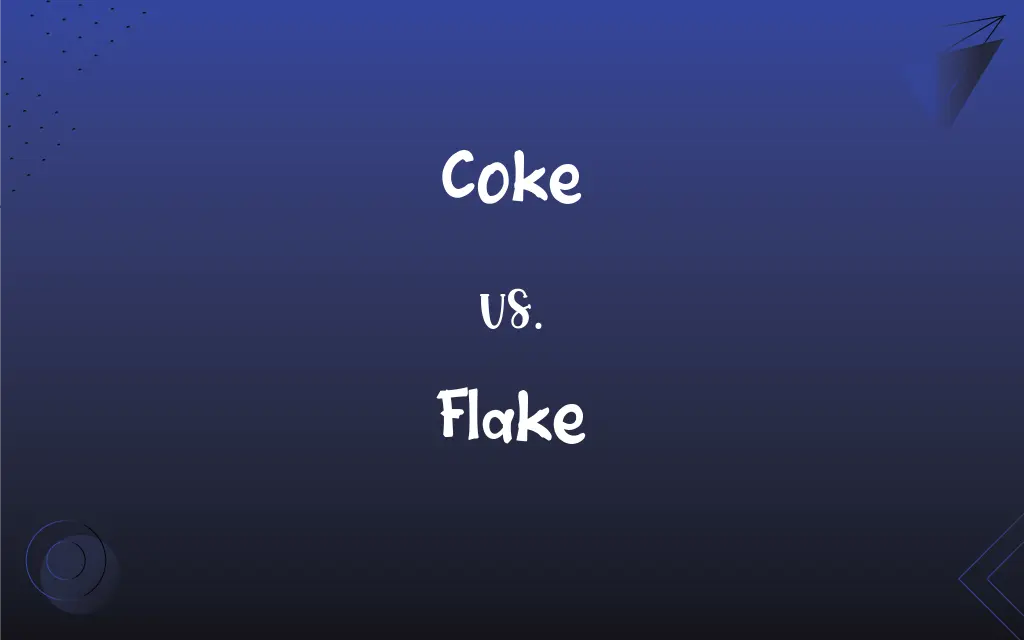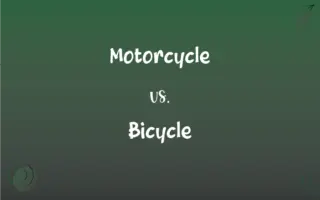Coke vs. Flake: What's the Difference?
Edited by Aimie Carlson || By Janet White || Updated on October 12, 2023
Coke is a carbonized coal used for fuel or a soft drink brand, while Flake is a thin piece or fragment, often of something brittle.

Key Differences
Coke, in one context, refers to a byproduct formed during the pyrolysis of coal. It's primarily used as a fuel and in steelmaking furnaces. This type of Coke is derived from the heating of coal in the absence of air, which removes impurities and volatile substances. Flake, however, doesn't carry such industrial connotations. It describes a small, thin piece or fragment of something, especially if it has broken off of a larger body.
Coke can also refer to the colloquial name for Coca-Cola, a popular soft drink brand. Many people, especially in certain regions of the United States, refer to this beverage simply as "Coke," regardless of its flavor or brand. Flake does not have such a beverage connection. Its meaning is more physical, relating to the form and shape of an object rather than a consumable product.
It's also worth noting that "flake" can be used as a verb, describing the action of breaking into thin pieces or fragments. For instance, "the paint flaked off the wall." Coke, in its meanings, doesn't serve as a verb in the same manner. When we say "Coke," it's typically a noun, whether referring to the fuel or the drink.
Flake can also be used in a colloquial sense, referring to someone who is perceived as eccentric, crazy, or unreliable. Someone might say, "He's a bit of a flake," suggesting unpredictability. Coke doesn't share this idiomatic use.
In summary, while both Coke and Flake are nouns, they pertain to vastly different things. Coke is tied to industry and beverages, whereas Flake pertains to thin fragments or, idiomatically, to someone unpredictable.
ADVERTISEMENT
Comparison Chart
Primary Definition
Carbonized coal used as fuel.
A thin piece or fragment.
Secondary Meaning
Colloquial name for Coca-Cola.
Someone unpredictable or eccentric.
Usage as a Verb
Not commonly used as a verb.
To break into thin fragments.
Associated Industry
Steelmaking, beverages.
None specific, but related to brittle materials
Idiomatic Usage
Rarely used idiomatically beyond soft drink context.
"A bit of a flake" referring to unpredictability.
ADVERTISEMENT
Coke and Flake Definitions
Coke
The colloquial name for the soft drink, Coca-Cola.
Can you grab me a Coke from the fridge?
Flake
A small, thin piece or layer of something.
She noticed a flake of paint peeling from the ceiling.
Coke
A processed form of coal used in manufacturing.
The steel industry is one of the major consumers of coke.
Flake
Someone considered to be unreliable or eccentric.
She's always late to meetings; such a flake!
Coke
A carbon residue produced by distillation of coal.
Coke is preferred due to its higher carbon content.
Flake
A snowflake.
As the first flakes of winter fell, children rushed outside to play.
Coke
A term often used generically to refer to any carbonated soft drink.
In some regions, all sodas are called Coke regardless of flavor or brand.
Flake
A flat thin piece or layer; a chip.
Coke
The solid residue of impure carbon obtained from bituminous coal and other carbonaceous materials after removal of volatile material by destructive distillation. It is used as a fuel and in making steel.
Flake
(Archaeology) A stone fragment removed from a core or from another flake by percussion or pressure, serving as a preform or as a tool or blade itself.
Coke
Cocaine.
Flake
A small piece; a bit.
Coke
To convert or be converted into coke.
Flake
A small crystalline bit of snow.
Coke
To affect or intoxicate with cocaine.
Flake
One who is undependable, as in keeping social engagements.
Coke
(uncountable) Solid residue from roasting coal in a coke oven; used principally as a fuel and in the production of steel and formerly as a domestic fuel.
Flake
A somewhat eccentric person; an oddball.
Coke
Cocaine.
Flake
(Slang) Cocaine.
Coke
Alternative case form of Coke.
Flake
A frame or platform for drying fish or produce.
Coke
Alternative case form of Coke.
Flake
A platform lowered over the side of a ship as a scaffold for performing maintenance or repairs.
Coke
Senseid|en|any soft drink, regardless of type}} {{alternative case form of Coke.
Flake
To remove a flake or flakes from; chip.
Coke
(transitive) To produce coke from coal.
Flake
To cover, mark, or overlay with or as if with flakes.
Coke
(intransitive) To turn into coke.
Flake
To lay out (a rope or sail, for example) in loose folds.
Coke
To add deleterious carbon deposits as a byproduct of combustion.
In kerolox engines, some of the fuel flow cokes in the engine's cooling passages over time, requiring thorough cleaning prior to reuse.
Flake
To come off in flat thin pieces or layers.
Coke
Mineral coal charred, or depriver of its bitumen, sulphur, or other volatile matter by roasting in a kiln or oven, or by distillation, as in gas works. It is lagerly used where smokeless fire is required.
Flake
To renege, as on a social engagement
Promised to go to the party but flaked at the last moment.
Coke
To convert into coke.
Flake
To fall asleep or collapse from fatigue or exhaustion
Got home and flaked on the sofa.
Coke
Carbon fuel produced by distillation of coal
Flake
A loose filmy mass or a thin chiplike layer of anything
There were a few flakes of paint on the floor from when we were painting the walls.
Flakes of dandruff
Coke
Coca Cola is a trademarked cola
Flake
A scale of a fish or similar animal
Coke
Street names for cocaine
Flake
(archaeology) A prehistoric tool chipped out of stone.
Coke
Become coke;
Petroleum oils coke after distillation
Flake
(informal) A person who is impractical, flighty, unreliable, or inconsistent; especially with maintaining a living.
She makes pleasant conversation, but she's kind of a flake when it comes time for action.
Coke
A hard, gray fuel derived from coal by removing its volatile substances.
The factory uses coke as its primary fuel source.
Flake
A carnation with only two colours in the flower, the petals having large stripes.
Flake
A flat turn or tier of rope.
Flake
A corrupt arrest, e.g. to extort money for release or merely to fulfil a quota.
Flake
A wire rack for drying fish.
Flake
(UK) Dogfish.
Flake
(Australia) The meat of the gummy shark.
Flake
A paling; a hurdle.
Flake
A platform of hurdles, or small sticks made fast or interwoven, supported by stanchions, for drying codfish and other things.
Flake
(nautical) A small stage hung over a vessel's side, for workmen to stand on while calking, etc.
Flake
(nautical) gloss=turn or coil of cable or hawser
Flake
To break or chip off in a flake.
The paint flaked off after only a year.
Flake
(colloquial) To prove unreliable or impractical; to abandon or desert, to fail to follow through.
He said he'd come and help, but he flaked.
Flake
(technical) To store an item such as rope or sail in layers
The line is flaked into the container for easy attachment and deployment.
Flake
To hit (another person).
Flake
To plant evidence to facilitate a corrupt arrest.
Flake
To lay out on a flake for drying.
Flake a fish
Flake
A paling; a hurdle.
Flake
A platform of hurdles, or small sticks made fast or interwoven, supported by stanchions, for drying codfish and other things.
You shall also, after they be ripe, neither suffer them to have straw nor fern under them, but lay them either upon some smooth table, boards, or flakes of wands, and they will last the longer.
Flake
A small stage hung over a vessel's side, for workmen to stand on in calking, etc.
Flake
A loose filmy mass or a thin chiplike layer of anything; a film; flock; lamina; layer; scale; as, a flake of snow, tallow, or fish.
Great flakes of ice encompassing our boat.
Flake
A little particle of lighted or incandescent matter, darted from a fire; a flash.
With flakes of ruddy fire.
Flake
A sort of carnation with only two colors in the flower, the petals having large stripes.
Flake
A person who behaves strangely; a flaky{2} person.
Flake
A flat layer, or fake, of a coiled cable.
Flake after flake ran out of the tubs, until we were compelled to hand the end of our line to the second mate.
Flake
To form into flakes.
Flake
To separate in flakes; to peel or scale off.
Flake
A crystal of snow
Flake
A person with an unusual or odd personality
Flake
A small fragment of something broken off from the whole;
A bit of rock caught him in the eye
Flake
Form into flakes;
The substances started to flake
Flake
Cover with flakes or as if with flakes
Flake
Come off in flakes or thin small pieces;
The paint in my house is peeling off
Flake
A fragment or splinter, especially of stone.
He found a flake of obsidian near the archaeological site.
Flake
To break or come off in thin fragments.
The old poster began to flake after years in the sun.
FAQs
What is Coke primarily used for?
Coke is primarily used as a fuel and in steelmaking.
Is Flake used as a verb?
Yes, "flake" can mean to break into thin fragments.
What is the meaning of Flake in the context of materials?
Flake refers to a small, thin piece or fragment of something.
Can Coke also refer to a drink?
Yes, Coke is a colloquial name for the soft drink, Coca-Cola.
Can all carbonated soft drinks be called Coke?
In some regions, people colloquially refer to all sodas as "Coke."
Is Flake always related to something breaking?
No, flake can also refer idiomatically to someone unpredictable or eccentric.
Can you give an example of a Flake in nature?
Snowflakes are natural examples of flakes.
Are there other types of Coke besides the one derived from coal?
While coke primarily refers to the fuel, it's also colloquially used for the drink Coca-Cola.
How is Coke derived from coal?
Coke is produced by heating coal in the absence of air to remove impurities.
Can the word Flake refer to someone's behavior?
Yes
About Author
Written by
Janet WhiteJanet White has been an esteemed writer and blogger for Difference Wiki. Holding a Master's degree in Science and Medical Journalism from the prestigious Boston University, she has consistently demonstrated her expertise and passion for her field. When she's not immersed in her work, Janet relishes her time exercising, delving into a good book, and cherishing moments with friends and family.
Edited by
Aimie CarlsonAimie Carlson, holding a master's degree in English literature, is a fervent English language enthusiast. She lends her writing talents to Difference Wiki, a prominent website that specializes in comparisons, offering readers insightful analyses that both captivate and inform.































































